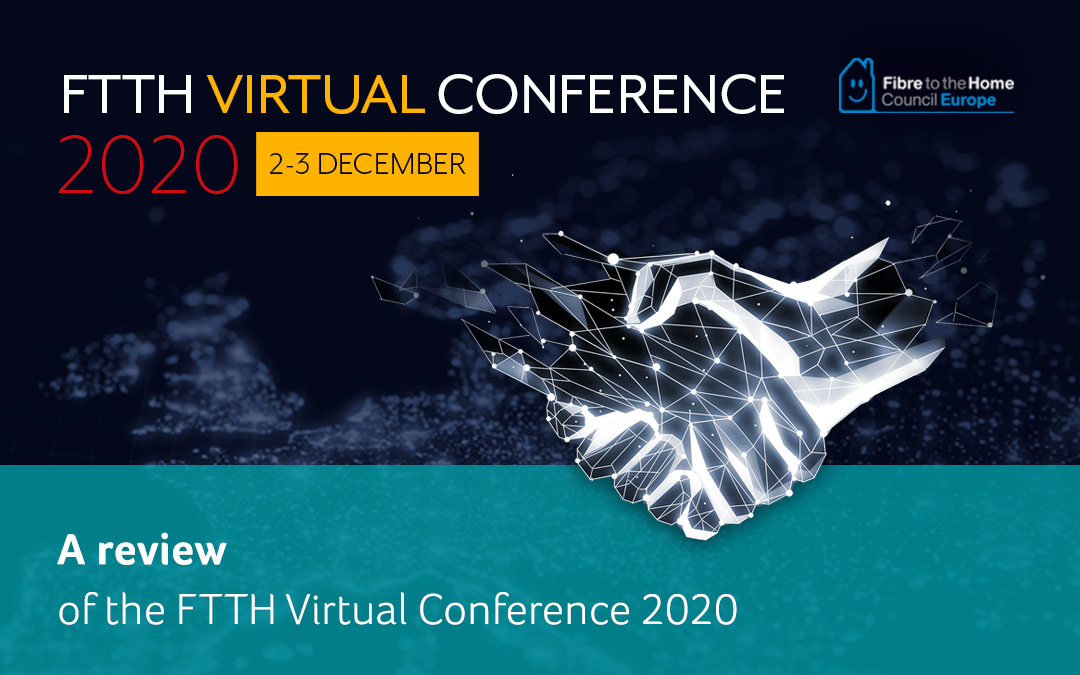Due to the coronavirus, this year’s FTTH Conference was held purely virtually – as the “FTTH Virtual Conference 2020” – from December 2 to 3. As a premium partner, aconium GmbH supported the world’s largest fibre optic summit. For the sixth time, the leading digitalisation service provider in Germany also organised the “Governmental Day Workshop” together with the FTTH Council Europe, which took place on the very first day of the event.
The new format of the trade fair presented itself as a successful alternative to the face-to-face trade fair and gave the industry the opportunity to come together again this year.
This year’s event once again brought together stakeholders from the fields of technology, regulation, politics and financing to discuss the latest fibre optic technologies and solutions, product innovations, financing options and political approaches. The clear goal: to further accelerate fiber and 5G connectivity in Europe.
Over 150 speakers gave presentations on the broad spectrum of FTTH and other fiber optic technologies, regulatory and service topics. In 19 workshops, 17 seminars and a separate networking platform, visitors to the virtual conference were able to exchange ideas on the topics of financing, technology and politics.
On the first day of the event, the “Governmental Day Workshop” offered an interactive platform for broadband stakeholders in the European Union and for regional initiatives of the member states to exchange ideas. This year’s focus was on the broadband and digitalisation policy of the EU and its member states as well as the innovations in the federal broadband funding programme.
Peyman Khodabakhsh, Project Manager aconium: “It was a completely new experience to organise the Governmental Day Workshop for the sixth time in a row, this time in a virtual format with a large number of participants. The virtual FTTH conference provided a great opportunity to exchange views on the progress made in all European Member States. All participants agreed on one point: reliable digital connectivity for all citizens is one of the key factors for our current and future resilience.”
The second day included the panel discussion “Germany goes Gigabit” as part of the financial discussion round. Four knowledgeable experts discussed views and forecasts on how broadband financing will develop in the near future. The panel on the topic of financing broadband infrastructure was moderated by aconium expert Christian Zieske.
The second day of the world’s largest fibre optic event began with an opening speech by Dorothee Bär, Minister of State for Digital Affairs. She emphasised the importance of gigabit infrastructure for the economy and society. According to Bär, access to gigabit networks is a key factor in increasing growth and prosperity in the 2020s.
Ms Bär also emphasised that Germany and Europe had made a huge leap forward in terms of digital transformation, which was unparalleled in terms of speed.
The latest figures published in the FTTH Council’s latest market forecast as part of this year’s FTTH Conference showed consistently positive signals with regard to the availability of fibre optic connections.
In the 27 member states of the European Union (plus the UK), the number of available FTTB/FTTH connections (“Homes Passed”) is expected to reach 202 million by 2026. According to figures from the FTTH Council, there were still 88 million FTTB/FTTH connections across the EU in 2019.
Significant growth is also expected in Germany by 2026: Compared to 2019, the availability of fibre optic connections to the building (FTTB) or directly to the user (FTTH) is expected to increase by 730% to 34 million connections, according to the forecast of the FTTH Council Europe.
The current corona pandemic is also contributing to this rapid growth, according to the organisers. The current situation should be seen as a multiplier that has reinforced the existing trend and demand for fibre optics. As a result, the public perception of the importance of broadband connections is changing permanently.

